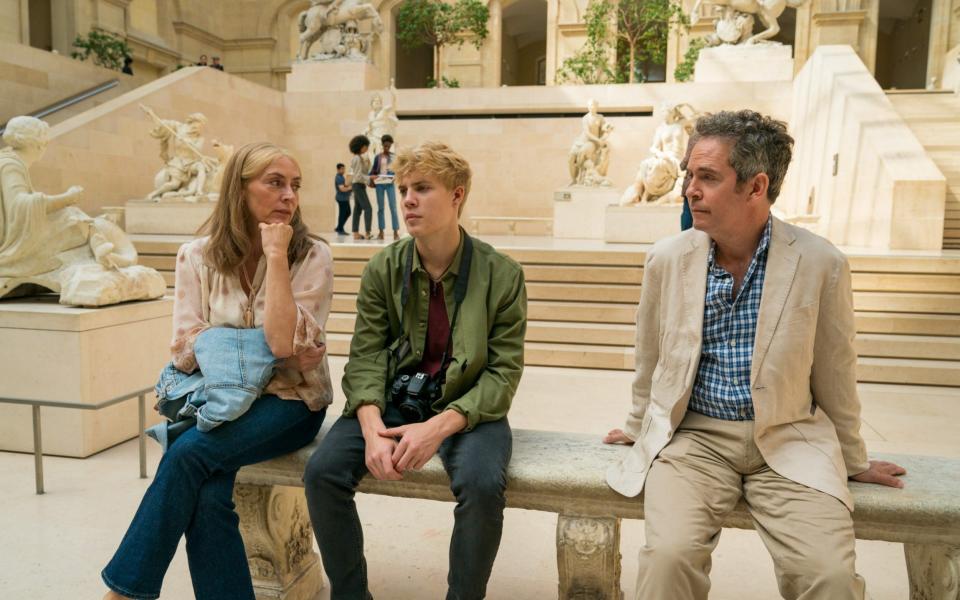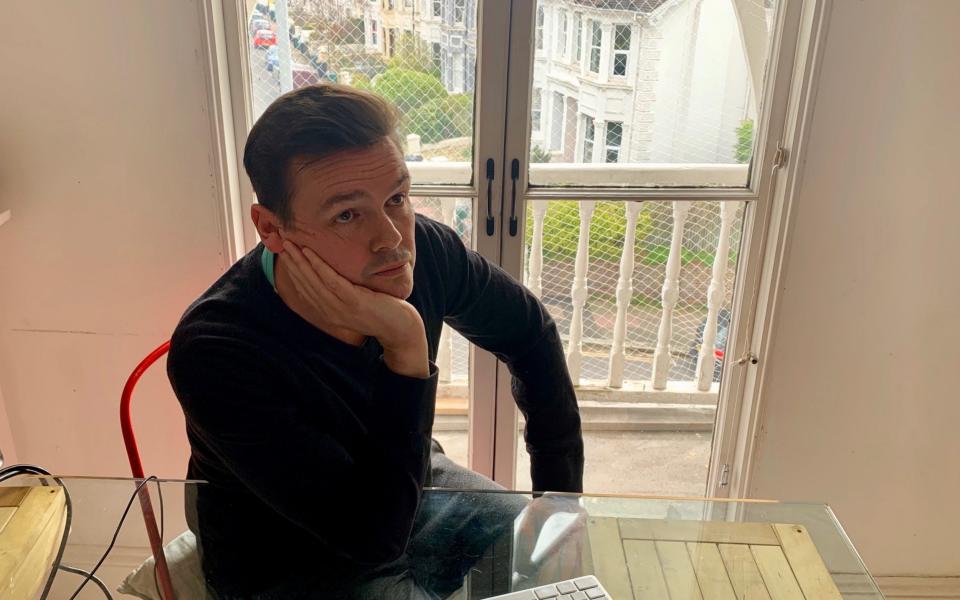Why do so many middle-aged men feel desperately lonely?

Any middle aged married couple that watched BBC’s new series Us on Sunday evening will have done so with a sense of awkwardness that only ever comes from something you know to be true. That’s precisely why I watched this programme alone – not because I think my wife and I are heading for a trial separation, like the show’s married couple Connie and Douglas, but because I knew it would, at times, be a little, well, uncomfortable.
Based on the novel by David Nicholls, Us is the story of a couple on the verge of splitting up. As an empty nest beckons, they embark on one last holiday across Europe with their 18-year-old son Albie. For Connie, it’s an opportunity to make some memories before they go their separate ways. For Douglas, it’s a final chance to change and win back the love of his life.
It’s brilliantly pitched. Tom Hollander’s Douglas is the archetypal midlife misanthrope while Saskia Reeves’s Connie, the frustrated wife, is convinced that there has to be something more to life than her current going-through-the-motions marriage.
The squirm factor
It’s the kind of programme that will have many couples squirming in their seats. While my wife Ann and I haven’t had the trial separation conversation that Douglas and Connie have, there are still far too many moments in the show that make for uneasy viewing, from insomnia to awkward teenagers and an obsession with step counting (guilty!) and worry you are falling into a ‘box set’ marriage. Watching it felt like someone had bugged our house. And yes, just like our anti-hero Douglas, I’ve had a meltdown at the local tip too. What middle aged man hasn’t?
In fact, any midlifer who tells you that they don’t recognise even a tiny bit of themselves in it is lying. For years the male midlife crisis has been a cliché characterised by extramarital affairs with younger women, a sudden interest in sports cars or motorbikes (only now it’s cycling) or, God forbid, a ponytail and leather trousers. In fact, as I am discovering, a real midlife crisis is quite different.

It’s an existential migraine that won’t budge. It’s that lack of purpose and direction as those arthritic knees catch up with you and you stagger towards retirement. Put simply, it’s that age-old question: is this it?
When it comes to expressing the complicated emotions of this time of life, I find women are much better at it than men are. In Us, we watch Connie complain that her and Douglas “never talk”. While he’s adamant that they talk all the time, it’s clearly not the conversations she wants or the ones they really need to be having.
My wife, a Mancunian with Irish heritage, can, and does, talk for Britain (and Ireland). I have long since realised that it is pointless arguing with her, largely because I know I can never win. The knock-on effect is that I avoid confrontation at all costs, often closing up and refusing to engage which, in turn, makes my wife even angrier, and with good reason. Does she too think we “never talk”?
My wife is naturally gregarious. She is in a podcast group and a curry club. She goes running with other women and enjoys city breaks with friends. She always has offers and she always makes the effort. You get out what you put in, I guess. In contrast, I feel alone – my wife and family are my world and the idea of them shrinking away from me is terrifying.
Man's best friend
When I turned 50 last year it dawned on me that I have never been a best man in my life. On one hand that’s great – no need to ever organise a stag do or make that dreaded speech . On the other, however, it’s maybe not so wonderful, because it tells me that I have never had a friend sufficiently close to be ever granted the honour.

It’s a common problem. According to a recent poll by YouGov, around one in five men in the UK claim to have no close friends, twice as many as the percentage for women. Another poll by Charity Age UK, meanwhile, showed a 50 per cent rise in the number of men admitting to feelings of loneliness in the past decade.
I wouldn’t say I was lonely but I have become more insular as the years have rolled by and that can impact on a relationship. I do tend to cocoon myself, even when there isn’t a global pandemic wreaking havoc with the diary (as if I need a diary). It’s a running joke in our house that I never go out and on the rare occasions I do, the look on my kids’ faces is one of deep, deep shock.
My children are 18, 17 and nearly 14. Soon they will be gone, off to begin the next chapter in their lives, leaving me and my wife at home – alone. In Us, Douglas and Connie’s son, Albie, deigns to go on a family tour of Europe with his parents – a remarkable achievement for the couple.

As our children have got older, it’s become clear, painfully so at times, that they just aren’t that interested in doing the things we used to do together as a family. They’ll come out with us if there’s free food to be had, but most suggestions either require protracted negotiations, weighing up the pros and the cons, or they simply fall on deaf ears (which usually have headphones over them anyway).
Desperate channel-hopping
Increasingly, it’s just me and Ann on the dog walk. Evenings used to mean all of us snuggling up on the sofa and watching something on TV together, but we now rarely agree on a programme so the kids tend to just retreat to their rooms instead. We still eat together most of the time (one of the few lasting benefits of lockdown), but once the plates are clean, the usual argument over whose turn it to clear up has been settled and the dishwasher’s been loaded, they just drift off with their devices again.
That leaves me and Ann searching for something to watch. This weekend, for instance, we found ourselves staring madly at 13 Moments That Killed Whitney Houston on Channel 5 and, 45 minutes in, we both agreed that watching late night documentaries on Channel 5 is a sure sign that your relationship might need a little attention.
In it together
Ann and I met on our first day at secondary school, aged 11. Next month, we will celebrate our 21st wedding anniversary and 26 years together. We’ve both changed in that time, certainly. She has become the perfect role model to our kids – hard-working, considerate and clever – whereas I’ve got just more attractive.
As I was making a dinner that nobody really wanted at the weekend, the song There Goes The Fear by Doves came on the radio. There’s a line in it that always chimes, but increasingly so now the kids have grown and I’m the wrong side of 50. It says: ‘You turn around and life’s passed you by,’ and it’s spot on.
We’ve already started talking about what we’re going to do once the kids finally go and it’s just me and Ann kicking our heels. We do have a plan of sorts, which largely involves downsizing, travelling and filling the void left by the children with another dog, who, theoretically, will be tidier, more considerate and always eat what it’s given.
While we disagreed about the destinations we would visit and the type of dog we might get, we did at least agree on one thing, for now. Whatever we do, we will do together.
Us is next on BBC One on Sunday 27 September at 9pm or is available to stream on BBC iPlayer


